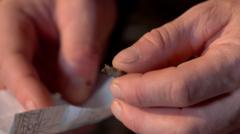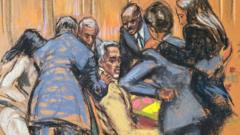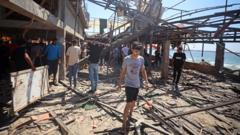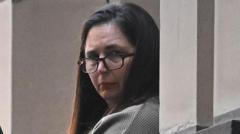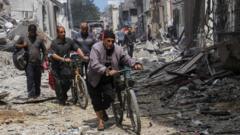Amidst fears of prolonged conflict, Ukraine's leaders urge the importance of support from Washington for their defense efforts.
**Ukraine Voices Deep Concerns Over US Military Aid Suspension amid Russian Hostility**

**Ukraine Voices Deep Concerns Over US Military Aid Suspension amid Russian Hostility**
Concerns mount as Ukraine warns Russian aggression could escalate following US halt on arm shipments.
As Russia’s military actions intensify, Ukraine is expressing alarm over the recent decision by the US to suspend certain military aid shipments. The White House announced the halt, stating that it was done to prioritize America’s own interests after a defense review, prompting Ukraine to fear that this could embolden Russian aggression as the war enters its fourth year.
Ukrainian President Volodymyr Zelensky indicated that both nations are working to clarify the situation regarding military supplies. The foreign ministry did not hold back its concern, stressing that any interruptions could lead to further escalation of Russian attacks instead of moving towards peace. Ukraine notably emphasized the urgent requirements for bolstering its air defenses, amidst ongoing bombardments from Russia, which have dramatically increased.
Reports indicated the US might delay shipments of crucial military hardware such as Patriot interceptors and Howitzer munitions; however, specific details regarding which shipments are affected remain unclear. While US military assistance has been substantial since the onset of the full-scale invasion in February 2022, concerns are emerging over dwindling US military stockpiles. Certain critics within the Trump administration have voiced apprehension about potential shortages impacting readiness.
The Kremlin welcomed the US decision, suggesting that reduced arms supplies to Ukraine would hasten the cessation of hostilities. The Ukrainian government, however, stressed its reliance on American support, as European allies have also contributed significantly but might not fill the gap if the US reductions persist.
Further complicating the matter, Czech President Petr Pavel noted uncertainty regarding continuing ammunition support, pointing out that future assistance will depend on outcomes from upcoming elections.
Despite the reservations expressed by the Pentagon about military stockpiles, the US continued to explore alternate avenues to assist Ukraine, reaffirming its commitment while urging for adjustments in its approach to ensure protection of fundamental military readiness.
In a related diplomatic effort, French President Emmanuel Macron spoke with Russian President Vladimir Putin, advocating for a ceasefire and peaceful negotiations—an approach met with assertions from the Kremlin downplaying Western accountability for the conflict's origins.
With ongoing military engagements and civilian casualties reported from both sides, Ukraine’s situation remains precarious, compounded by the uncertainty in military support that could have dramatic implications for the future of the war.
Ukrainian President Volodymyr Zelensky indicated that both nations are working to clarify the situation regarding military supplies. The foreign ministry did not hold back its concern, stressing that any interruptions could lead to further escalation of Russian attacks instead of moving towards peace. Ukraine notably emphasized the urgent requirements for bolstering its air defenses, amidst ongoing bombardments from Russia, which have dramatically increased.
Reports indicated the US might delay shipments of crucial military hardware such as Patriot interceptors and Howitzer munitions; however, specific details regarding which shipments are affected remain unclear. While US military assistance has been substantial since the onset of the full-scale invasion in February 2022, concerns are emerging over dwindling US military stockpiles. Certain critics within the Trump administration have voiced apprehension about potential shortages impacting readiness.
The Kremlin welcomed the US decision, suggesting that reduced arms supplies to Ukraine would hasten the cessation of hostilities. The Ukrainian government, however, stressed its reliance on American support, as European allies have also contributed significantly but might not fill the gap if the US reductions persist.
Further complicating the matter, Czech President Petr Pavel noted uncertainty regarding continuing ammunition support, pointing out that future assistance will depend on outcomes from upcoming elections.
Despite the reservations expressed by the Pentagon about military stockpiles, the US continued to explore alternate avenues to assist Ukraine, reaffirming its commitment while urging for adjustments in its approach to ensure protection of fundamental military readiness.
In a related diplomatic effort, French President Emmanuel Macron spoke with Russian President Vladimir Putin, advocating for a ceasefire and peaceful negotiations—an approach met with assertions from the Kremlin downplaying Western accountability for the conflict's origins.
With ongoing military engagements and civilian casualties reported from both sides, Ukraine’s situation remains precarious, compounded by the uncertainty in military support that could have dramatic implications for the future of the war.

